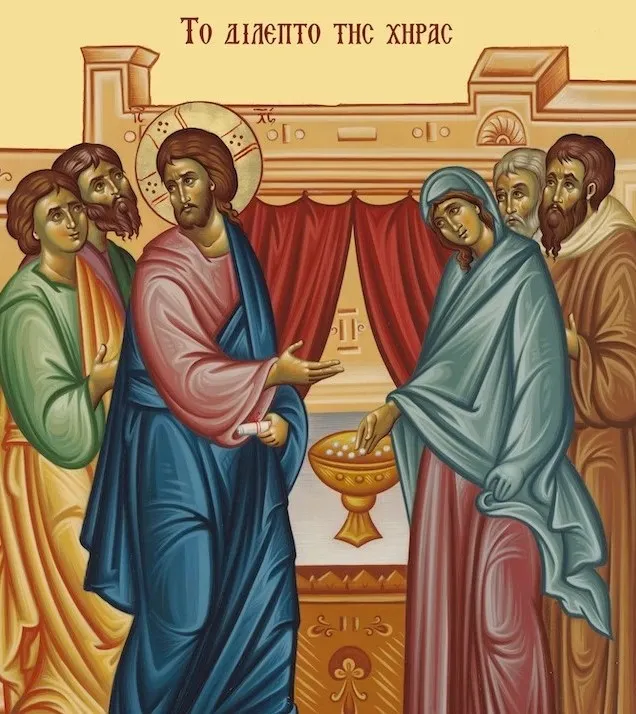The Power of Humility
Thirty-Second Sunday Scripture Readings

Once again, in today’s gospel reading, we find in Jesus’s teachings a strong warning against those values that humanity seems to find most dear: wealth, power, and prestige. They make up the godless trinity that humans use to create and maintain the illusion of control over their destiny and they’re the values that people most often turn to for the solutions to their problems. What makes these values so seductive is that they appear to deliver what they promise—at least in the short run. It’s that promise of a simple, easy fix to life’s problems that keeps people coming back to the pursuit of wealth, power, and prestige, time and time again. This despite the fact that, in the long run, they always fail and generally leave the problems and the people who suffer from them worse off than before.
How many examples of these types of failed solutions could we cite? The kingdoms of Israel and Judah? The Babylonian Empire? The Persian Empire? The Roman Empire? The Austro-Hungarian Empire? The Third Reich? Or, closer to home, the Confederacy? These are simply some of the most obvious examples. Were we to look closely at any society of any size that’s based on these three principles, we’d always find weakness and failure. And the more importance those societies give to wealth, power, and prestige, the quicker and more complete the collapse. Now it seems that our own nation has wholeheartedly embraced that “solution,” and the consequences are yet to be seen.
Jesus never made any bones about the evils of wealth, power, and prestige as a panacea for what ails a people or a culture. How many times and in how many ways did he say, “The last shall be first and the first shall be last”? For, in God’s eyes—the God who designed and built the structure that we call “reality”—the solution to every difficulty lies in humility. As always, that doesn’t mean humiliation. Rather, it’s the acceptance of life on life’s terms. It’s an honest relationship with reality. It’s seeing ourselves and God sees us—with both our weaknesses and our strengths—and acting accordingly.
That’s why the widow in the gospel is a sign of the reign of God, while the Pharisees are not. The widow was in a particularly precarious position. Married women in Israel in Jesus’s time had to rely on their husbands for their income, and that was just a cultural fact. But, when a husband died, his wife’s dependence continued. She had either to return to her parents’ house or to be taken in by one of her sons. If a widow had no living parents and no male children, she would find herself destitute, scraping together bits of food, clothing, and shelter for herself. Of course, she’d be devoid of wealth, power, and prestige. If, as a married woman, she’d entertained any such illusions, they’d disappear very quickly. She’d have to cope with what an honest relationship with reality means in practice. It was from that standpoint that our widow put her trust in God and gave of the little that she had.
Not so for the Pharisees for whom the pursuit of wealth, power, and prestige seemed to have paid off quite well. Their displays of piety and the honors accorded to them gave them the illusion of success. In fact, those things blinded and insulated them from the rather brutal reality that their situation was no less dependent on conditions in their environment than were the widows, and those situations could change in an instant. What’s more, their playing at spirituality, lacking a fundamental trust in God rather than in their wealth, power, and prestige, would leave them even weaker and more vulnerable when their fortunes did take a turn for the worse.
There’ve always been followers of Christ who don’t get it. There are self-proclaimed Christians who believe in the so-called “prosperity gospel” that pretends that wealth, power, and prestige are signs of God’s special favor. They neglected to pay attention when they read in the gospels about Christ’s temptations in the desert, where he clearly showed that these things are not from God but from our darker, selfish, self-centered natures. In a very real sense, we could rightly say that relying on the promises of wealth, power, and prestige could be called humanity’s “original sin.” What was it the snake promised the woman in the garden, but power and prestige? Wasn’t that precisely the death trap that Jesus came to liberate us from?
Citizens of the nations of the world have not always been wise. In fact, the opposite is true. Nations have life spans that start with noble and even heroic principles but slowly, over time, they degrade under the intoxicating allure of wealth, power, and prestige—those principles that masquerade as “success.” Nations come and nations go. It seems inexcusable to me, though, that people who call themselves followers of Christ should put themselves in the forefront of those who would pervert and discredit the Christian message of humble trust in God and replace it with the false gospel of wealth, power, and prestige. Yet, that is what we’re witnessing in this country. May God take pity on us all, poor sinners that we are.
Get articles from H. Les Brown delivered to your email inbox.
